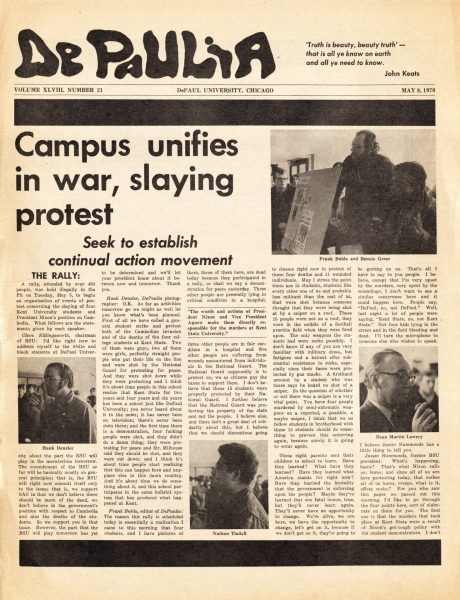Former DePaul athletic department employee files lawsuit against university for unpaid wages
DePaul is currently one of only 23 percent of private American universities that does not offer its students health insurance.
A former DePaul athletic department employee is suing the university for failing to pay them overtime and minimum wages, according to a document obtained by The DePaulia. Catherine Ramsey filed the lawsuit on Friday to the Northern District of Illinois.
Ramsey, 61, was DePaul’s administrative assistant to the athletic director and served as the athletic events coordinator for 18 years. According to the document, Ramsey left DePaul on March 5.
The complaint states that Ramsey was a non-exempt employee — which means those workers are entitled to earn federal minimum wage and also qualify for overtime pay, which is calculated as one-and-a-half times their hourly rate for every hour they work above a normal 40-hour workweek.
These guidelines are created by the federal Fair Labor Standards Act (FLSA).
Ramsey v DePaul University by DePaulia on Scribd
According to the complaint, Ramsey is owed “tens of thousands of dollars of regular and overtime payments over the years.” There are three claims that Ramsey is asking the court to consider: violation of the FLSA, violation of Illinois’ minimum wage law and violation of the Illinois wage payment and collection act.
Prior to 2007 or 2009, per the document, Ramsey held the title of executive assistant to the athletic director, which was Jean Lenti Ponsetto before she retired last summer. Ramsey’s tasks included maintaining Lenti Ponsetto’s calendar, organizing and handling her expense reports, reserving rooms for meeting and performing other tasks assigned by Lenti Ponsetto.
Ramsey was listed as an hourly employee, working a 35-hour workweek and was paid on an hourly basis, according to the document.
Furthermore, Ramsey was required to perform event coordinator functions, including organizing events at basketball games and other DePaul sporting events. Per the complaint, Ramsey attended every men’s and women’s basketball game and stayed throughout the game.
The complaint alleges that Ramsey worked “up to or over hours” when those hours were included, but DePaul did not pay her those hours. Then, in either 2007 or 2009, DePaul changed Ramsey’s title to athletics event coordinator, even though her duties never changed. At this time, DePaul listed Ramsey as an exempt employee, which means that she is no longer eligible for overtime pay and is excluded from minimum wage requirements, so DePaul awarded Ramsey a $51,000 salary for a 35-hour workweek, even though her duties and responsibilities remained the same, per the document.
According to the complaint, nothing about Ramsey’s job changed.
“She still performed strictly administrative functions,” the document reads. “She still reported to the Athletics Director. She had no supervisory or managerial responsibilities. And she still was not paid at all for hours worked in excess of 35 hours per week.”
In terms of overtime hours, the complaint alleges that Ramsey worked between 40 and 65 hours in a workweek when there were sporting events, but did not receive any pay for those hours.
According to the complaint, during the 2018-19 season, she worked 93 hours at men’s basketball games, 58.6 hours at women’s basketball games, 14 hours at men’s and women’s soccer games and 11 hours at volleyball and softball games. Ramsey never received any wages for those hours, per the document.
In addition, the complaint says that Ramsey worked a minimum of 54.2 hours on evenings and weekends that had to do with athletic department events – such as alumni day, awards dinners, NCAA Selection show dinners, golf outings and other events. Once again, according to Ramsey, DePaul never paid her for those hours.
According to the document, Ramsey worked similar hours without pay during the 2019-20 and 2020-21 academic years and “for at least 10 years prior to the filing of this complaint.”













anonymous • Jun 24, 2021 at 12:10 pm
Advancement Employee: I know exactly who you are talking about. Very disturbing situation. Do I publicize his name on here for the DePaulia to see?
Is there ever a real name: quite true
Is this ever a real name • Jun 23, 2021 at 7:22 pm
Those in power who do wrong continue to do wrong because they are in power. Pretty obvious. The fear of retaliation prevents people from reporting things when their jobs are on the line. There’s nothing HR can do to address that. The only option is to rid DePaul of bad actors.
Advancement Employee • Jun 23, 2021 at 4:45 pm
Thank you Thomas for posting this! I watched first hand the way this employee was treated by that horrible homophobic individual! Shame on the university for covering up for Ivan who was not loyal the the university and left knowing what he did! It’s so sad to think someone has such a cold heart to be so cruel and hurtful to such a kind soul. I pray the DePaulia digs deep to expose DePaul for what they are!!!!!!!!
Pat • Jun 23, 2021 at 11:05 am
The DePaulia needs to dig deep and investigate all the departments within the university! Many of my colleagues have also been forced to work over their regular hours with no compensation. It’s sad to think the largest Catholic University would allow their staff to be treated this way and not follow their own mission.
Athletic Department Alum • Jun 22, 2021 at 9:30 pm
SLM, you clearly are clueless! Anyone who worked for this Lenti mob was silenced and feared losing their job!
Athletic Department Alum • Jun 22, 2021 at 8:38 pm
Yes, the courts will hear the facts! The supervisor didn’t retire her contract was up and the university knew they needed to get rid of her! This is one of three lawsuits against this in competent over payed un educated athletic director
Athletic Department Alum • Jun 22, 2021 at 8:29 pm
This is so sad! I’m not picking sides here but will say that Mrs. Ramsey was the best! She always greeted me with a smile and thanked me for all I did…she will be missed!
SLM • Jun 22, 2021 at 8:24 pm
I suppose that the court will hear the facts to determine if the administration violated a labor law.
But shouldn’t the employee have complained, discussed, negotiated and resolved this issue many many years ago, long before her long time supervising employee retired?
Former staff • Jun 22, 2021 at 8:19 pm
Please expose this corrupt department! There are so many victims and so many afraid to come forward! There were so many great employees forced out at the hands of Jeanne Ponsetto! Please do a full investigation!
Former grad assistant • Jun 22, 2021 at 7:57 pm
As a former grad assistant I can contest to the unfair treatment at the hands of Karen Loiacono! I was told if I didn’t work the hours i would be fired and black balled! My close friends who worked for Peter Tombasco suffered the same abuse! I’m standing with Mrs. Ramsey….no bigger heart!
Season ticket holder • Jun 22, 2021 at 7:17 pm
As a long time season ticket holder and donor I’m appalled to read thIs!!!! I knew Jeanne Ponsetto ran the MBB program into the ground but can’t believe she would treat her staff this way! I can personally attest to the fact that Katie Ramsey was the nicest, welcoming, caring person that made everyone feel part of the DePaul family! Keep digging DePaulia!!!!!!!!
PMD • Jun 22, 2021 at 7:13 pm
How in the world did this happen to one of the department’s most loyal and hardest workers?One can only imagine what she must know of the behind the scenes coverups of the Lenti gang. And The new athletic director started with her when he wanted to clean house, after telling her her job was safe within the university. As a former grad student, we were expected to work 30 hours per week, for a monthly stipend. Never did we work just 30 hours. Our parents questioned the situation, and were lied to by he former AD and her staff, that we would be given hourly compensation for all hours that we illegally worked. That never happened. But the former AD was compensated nearly a half million dollars a year, while Mrs. Ramsey made one-tenth of that! This is abuse in many forms.
Former Grad assistant • Jun 22, 2021 at 7:12 pm
How in the world did this happen to one of the department’s most loyal and hardest workers?One can only imagine what she must know of the behind the scenes coverups of the Lenti gang. And The new athletic director started with her when he wanted to clean house, after telling her her job was safe within the university. As a former grad student, we were expected to work 30 hours per week, for a monthly stipend. Never did we work just 30 hours. Our parents questioned the situation, and were lied to by he former AD and her staff, that we would be given hourly compensation for all hours that we illegally worked. That never happened. But the former AD was compensated nearly a half million dollars a year, while Mrs. Ramsey made one-tenth of that! This is abuse in many forms.
Former AD staff member • Jun 22, 2021 at 5:21 pm
I am so happy to see that someone finally had the courage to come forward and expose the athletic department and Jeanne Ponsetto for the mistreatment of staff! I too was required to work way over the time I was required with no compensation and was told the university does not allow comp days and there was no budget for overtime pay! I hope the DePaulia digs deep and looks into the treatment of staff, student workers, sports managers and GA’s! The athletic department certainly didn’t practice the Vincentian Mission.